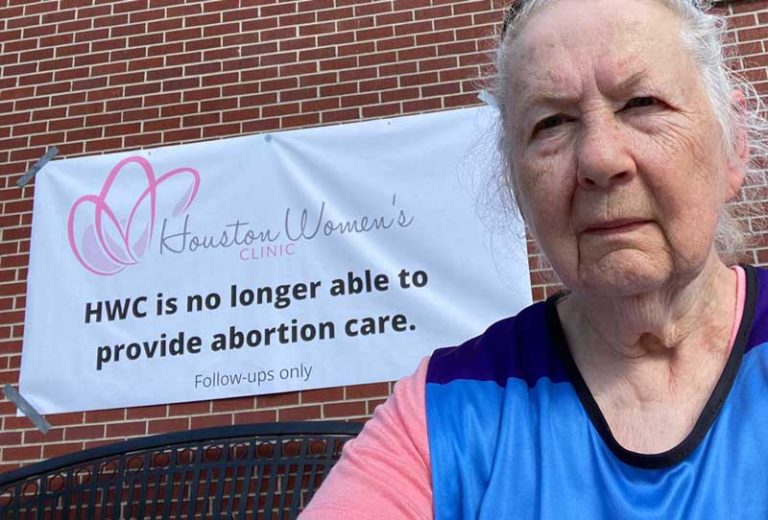Over a third of those facilities have fully closed, meaning patients also lost “access to contraceptive care, STI testing and treatment, and pregnancy care,” said a Guttmacher Institute researcher.
Jessica Corbett October 6, 2022 for Common Dreams
Since the U.S. Supreme Court gutted reproductive rights this summer, at least 66 clinics across 15 states have stopped offering abortion care, the Guttmacher Institute revealed Thursday.
“An already precarious abortion access landscape is likely to continue to deteriorate.”
The analysis builds on research that the pro-choice institute conducted the month after June 24, when the high court’s Dobbs v. Jackson Women’s Health Organization ruling reversed Roe v. Wade, leading to battles over both “trigger laws” and new bans on care.
In the first 100 days post-Dobbs, the number of clinics providing abortions across the 15 states studied dropped from 79 to 13, and all that continue to offer such care are in Georgia.
No clinics are currently offering abortion services in Alabama, Arizona, Arkansas, Idaho, Kentucky, Louisiana, Mississippi, Missouri, Oklahoma, South Dakota, Tennessee, Texas, and West Virginia—which have all enacted bans since Dobbs. Meanwhile, providers in Wisconsin have halted abortions due to uncertainty about an 1849 ban.
“Altogether, these 15 states are home to almost 22 million women of reproductive age (aged 15-49), in addition to other people who may not identify as women but are capable of becoming pregnant and may need an abortion,” the analysis points out. “That means almost one-third (29%) of the total U.S. population of women of reproductive age are living in states where abortion is either unavailable or severely restricted.”
“Even before Roe was overturned, getting an abortion was difficult or outright impossible for many people, especially those who were already facing steep barriers to accessing healthcare, including people with low incomes, Black and Brown people, immigrants, young people, those with disabilities and rural populations,” the report acknowledges. “These inequities are likely to worsen as clinic-based abortion care disappears in many states.”
The analysis—which does not include data on doctor offices and hospitals that provided abortions before Dobbs—also warns that “an already precarious abortion access landscape is likely to continue to deteriorate,” with the institute’s state legislative tracking predicting “26 states are certain or likely to ban abortion within a year of Roe being overturned.”
As The 19th reported Thursday:
In Ohio and Indiana, courts have blocked the states’ respective six-week and near-total abortion bans. Near-total bans remain blocked in Utah and Wyoming. And state courts in South Carolina and Iowa have not allowed six-week bans to take effect.
All of those cases are being actively litigated.
Meanwhile, lawmakers in other states may push to enact more punitive restrictions. In Nebraska, the governor attempted to call back the Legislature to pass some form of abortion ban but reportedly fell three shy of the number of votes needed to pass a 12-week abortion ban. Florida is currently banning abortion for people after 15 weeks of pregnancy, but the Legislature is expected to debate a stricter ban in the coming year.
“The number of clinics providing abortion care will get lower,” Rachel Jones, principal research scientist at Guttmacher, told the outlet. “The number of clinics that will have to shutter completely is going to increase.”
Jones highlighted that anti-choice laws can impact clinics even if they are ultimately overturned.
“It’s not just a matter of, ‘Oh, we’ll just close our doors because there’s an abortion ban and we can reopen overnight if the ban is lifted,'” she explained. “All this off and on is very difficult for clinics to operate. They can’t afford to keep staff on hand.”
The institute researchers found that of the 66 clinics identified where abortion is no longer offered, 40 still provide other healthcare services while 26 have fully shut down.
“This means people in these communities are not going to have access to contraceptive care, STI [sexually transmitted infection] testing and treatment, and pregnancy care, which some of these facilities that closed completely were offering,” Jones told USA TODAY.
Abortion restrictions burden not only patients seeking services in their states but also providers—and thus, patients—in states where care is still allowed, the Guttmacher report stresses.
“Individuals who can no longer obtain an abortion from a clinic in these states are now forced to travel to another state for abortion care (facing additional direct and indirect costs associated with travel logistics, child care and time off work), self-manage their abortion, or continue their pregnancy (and accept the significant associated health risks),” the analysis states.
Citing anecdotes of providers in pro-choice states “being inundated” with patients who can’t get care closer to home, the report adds that “dramatic increases in caseloads mean clinic capacity and staff are stretched to their limits, resulting in longer wait times for appointments even for residents of states where abortion remains legal.”
According to USA TODAY:
Demand for the procedure at a Planned Parenthood clinic in southern Illinois, where abortion remains legal, has “really just exploded” since the Supreme Court’s ruling, said Dr. Colleen McNicholas, chief medical officer for Planned Parenthood of the St. Louis Region and Southwest Missouri, which operates the facility just miles away from St. Louis and also has plans for a mobile clinic in Illinois.
Pregnant patients who used to get an appointment in two or three days now can wait up to three weeks, even with the clinic ramping up to 10-hour days six days a week. “Folks are coming from all over the country for this care,” she said, with the Illinois clinic experiencing a 435% increase in patients from beyond Illinois and Missouri between June and September.
Guttmacher’s findings were released about a month before the U.S. midterm elections, when voters will weigh in on some state-level ballot measures on abortion rights and determine whether Democrats retain control of both chambers of Congress.
Several congressional Republicans, led by Sen. Lindsay Graham (R-S.C.), have vowed to pursue a federal ban on abortion if the GOP wins majorities in the House and Senate.


